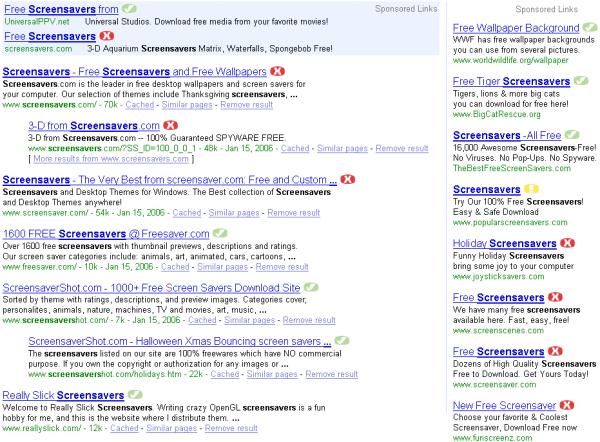This article uses data from SiteAdvisor, a company to which I serve as an advisor.
Much of the computer security industry acts like spyware is immaculately conceived. Somehow it just appears on computers, we are led to believe, and supposedly all we can do is clean up the mess after it happens, rather than prevent it in the first place. I disagree.
Now, we all love Google. I use Google’s search site all day every day, and I enjoy their downloadable applications too. So I have the greatest respect for Google’s core service. But there’s another side to their business. Indirectly, Google and other search engines make big money from spyware, through paid search advertising that infects users who don’t know any better or don’t understand what they’re getting into.
Consider a Google search for “screensavers”:
The colored icons next to search results were inserted not by Google, but by the SiteAdvisor client application, based on the results of SiteAdvisor’s automated tests for each listed site. Six of Google’s ten sponsored links get “red” or “yellow” ratings — generally indicating unwanted advertising through spyware or, in some instances, high-volume commercial email. But without SiteAdvisor (or some similar protection), users would have no idea which sites were safe; they’d be at great risk of clicking through to an unsafe site, ultimately risking installation of unwanted software.
Screensaver Advertisers’ Business Model
Google surrounds its “screensavers” search results with ten ads selected from interested Google advertisers. Whenever I see a company buying an ad (online or offline) for a “free” product, I ask myself: How do they make money? With few exceptions, companies only buy online advertising when they expect to get something directly in return. (There are exceptions — dot-com bubble “eyeball” purchases, Fortune 500 “brand building,” perhaps some free ads offered by the Google Foundation.) But in the case of these screensaver providers, they’re almost certainly making money somehow if they can afford to pay Google’s high pay-per-click prices.
So how do Google’s screensaver advertisers make money? Most of Google’s screensaver advertisers really do offer screensavers that are “free” in the sense that users need not provide a credit card number. But they’re not free in the sense of being available without substantial adverse effects. Quite the contrary: Users must put up with various forms of intrusive advertising.
Let’s look at funscreenz.com, a top-ten Google advertiser for “screensavers.”

Funscreenz.com is owned by BestOffersNetwork, which is another name for notorious “adware” company Direct Revenue. Recall Direct Revenue’s Newsweek profile – plenty of users (and multiple lawsuits) alleging that their software installs improperly and, in many cases, without consent. I’ve previously documented Direct Revenue installed in tricky popups, via false claims of purportedly-required add-ons, and through exploits without any consent at all.
Of course Funscreenz is not alone. Also in top “screensavers” Google results are ads for Claria, Ask Jeeves, and various adware bundlers (who distribute changing or multiple advertising programs). One top Google “screensaver” advertiser sends 15+ emails per week to those who provide an email address to get a screensaver. Results at Yahoo and MSN are similar.
Estimating Search Engine Revenues from Spyware Infections
Every time a user clicks through a search engine ad, the search engine gets paid. Google doesn’t ordinarily say how much advertisers pay. But Yahoo (which does) charges about $0.25 for a “screensavers” click. Let’s do some math. Of the users who click through to screensavers.com, suppose 10% actually download a screensaver – a conversion rate most web sites would celebrate. Then screensavers.com needs to earn $2.50 per download ($0.25/10%) just to break even. That’s a lot of money per download. But they’re buying the ads anyway, and they’re savvy decision-makers. So we can deduce that this site grosses at least $2.50 per download.
How much money do search engines make from these ads? Some initial back-of-the-envelope estimates: According to Yahoo’s keyword inventory tool, “screensaver” (and its hundred most common variants) received about 2.3 million searches in December 2005. Suppose 20% of those searchers clicked on paid links. (That’s conservative, since ads fill more than half of typical users’ screens.) As estimated above, suppose Yahoo collects $0.25 per paid click. Then Yahoo made about $115,000 in December 2005 from “screensaver” and variants. Throw in Google, with its bigger market share, and “screensaver” likely yields about $250,000 of revenue per month.
Of course, not all “screensaver” ads ultimately yield spyware. But from SiteAdvisor’s tests, it seems at least 60% push spyware, spam, or similar unwanted materials. So Google and Yahoo’s “dirty” revenue, from dubious screensavers ads, is probably about $150,000 per month.
But “screensaver” is only one of many terms that commonly leads to spyware and adware. I’ll look at other risky keywords in future articles, as I try to measure the prevalence of this problem in greater detail. Reviewing traffic data from Yahoo’s inventory tool, I’m confident that similarly-affected keywords total at least fifteen times the traffic to “screensavers.” Then Google and Yahoo make about $2.2 million per month, or $26 million per year, through this spyware-pushing advertising. That may not be big money to them, but to my eye it’s a lot.
Clearly there are quite a few estimates here. Send email for methodological improvements and alternative data sources.
As with so many great Internet inventions, the bad guys have stormed the gates of search engines. Now is the time to start fighting back. That doesn’t mean search engines should blacklist every company I ever criticize, but some “adware” vendors are so shady that search engines could proudly refuse their money. Responsibility starts at home. More on search engines’ possible strategies in a future article.
Past work on search engines funding spyware: Yahoo ads syndicated into spyware, Google ads shown through spyware-delivered popups and other vendors’ improperly-installed toolbars.
